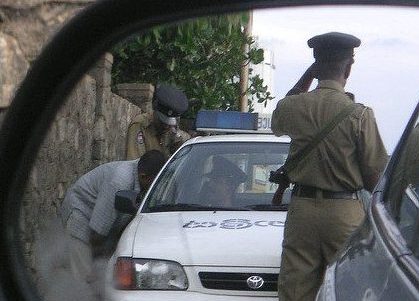
Sri Lankan Police Found Responsible for Torture and Arbitrary Arrest of Young Man Beaten and Attacked with Acid
The Human Rights Committee, a UN body which examines human rights complaints, has found Sri Lanka responsible for the arbitrary arrest and torture of Asantha Aravinda by the Sri Lankan police in 2008.
REDRESS and Asian Human Rights Commission (AHRC), who brought the case before the Committee in 2011, welcome the decision issued on 24 November 2021.
On 28 February 2008, Asantha Aravinda was riding a scooter with a friend when they almost collided with a truck, whose driver had missed a traffic light. After exchanging some words, the two young friends drove away, but the truck driver followed them and struck the motorbike, leaving them both severely injured. Shortly after, the truck driver and some officers of the Pitabaddara police station tied Asantha and his friend’s hands and beaten them up. The truck driver poured acid into Asantha’s face in front of the police, causing him severe injuries in his eyes.
After the incident, Asantha and his friend were taken to the Pitabaddara police station, where they were beaten by the police, and denied access to medical care, which resulted in Asantha losing permanently sight in one eye. The police also falsified charges against Asantha and his friend, accusing them of the attempted murder of the truck driver and possession of a firearm and a hand grenade.
Despite the numerous complaints submitted in Sri Lanka by Asantha’s father, none of the perpetrators was ever tried. In 2016, as a result of a constitutional complaint filed by Asantha’s father, the Supreme Court of Sri Lanka found that the Pitabaddara police station was responsible for delaying medical care to Asantha, which constituted ill-treatment. The Supreme Court awarded compensation which was paid to him.
In its decision, the Committee found that the torture, the use of acid and beatings by the truck driver, the police’s failure to protect him while in their control and to provide medical assistance, and the abuse by the police officers during his detention, of all which caused Asantha severe pain and permanent disability, violated the prohibition of cruel, inhuman and degrading treatment.
Further, the Committee found that Asantha’s arrest had not been reasonable and necessary, and that he was never convicted of any charges, which rendered his arrest and detention arbitrary.
Finally, the UN body concluded that Asantha did not have access to an effective remedy, as the perpetrators were never tried and the complaints he had brought in Sri Lanka had resulted in limited liability and compensation.
The Committee has ordered Sri Lanka to launch a proper investigation into the facts, prosecute, try and punish those responsible, provide him with adequate reparation, and take steps to prevent similar violations in the future.
“The case of Asantha Aravinda is, unfortunately, not an isolated incident. The use of torture by police has been, and remains, routine. The Sri Lankan authorities should take a long, hard look at the decision of the Human Rights Committee and bring forward the necessary legal and policy reforms to protect people in Sri Lanka from torture and other abuses by the police without delay”, Alejandra Vicente, REDRESS’s Head of Law.
Read more about the case here.
For more information or for an interview, please contact Eva Sanchis, REDRESS’s Head of Communications, on [email protected] or +44 (0) 7857110076.
Photo credit: Indi Samarajiva, CC BY 2.0
